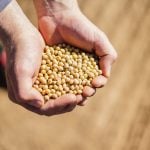The federal government is set to run a study reconsidering the previous administration’s decision to shut farming operations at federal penitentiaries.
Following up on a Liberal campaign pledge, the Correctional Service of Canada (CSC) announced plans Thursday for a feasibility study including both in-person and online consultations with stakeholders and the public.
Specifically, CSC said its study will “assess the effectiveness and viability of re-establishing agriculture and agri-food employment initiatives for offenders” at two institutions at Kingston, Ont.
Read Also

New rules on passive investment arrive in budget
It’s got no new nuggets specifically for crop or livestock producers, but Tuesday’s federal budget includes the end results of…
The study will look at farm operations for Collins Bay, which has maximum, medium and minimum security facilities, and for Joyceville, a medium/minimum security operation. The two Kingston facilities, both for male offenders, have capacity for over 1,400 inmates in total.
“Our government understands that an effective criminal justice system is built on evidence-based policies that promote public safety and the reintegration of offenders,” federal Public Safety Minister Ralph Goodale said in a release.
“That’s why we will be reviewing the cost and effectiveness of reinstating the prison farm program at Collins bay and Joyceville Institutions, and encouraging citizens, business leaders and other interested stakeholders to share their visions for what the program could look like.”
Both Collins Bay and Joyceville saw expansions built under the then-Conservative government’s long-term plan to add over 2,700 beds at men’s and women’s penitentiaries across the country.
CSC said Thursday its online forum will be open from now until Aug. 2, allowing “stakeholders from government, business, and the community… to share their opinions.”
The service also plans to hold a town hall meeting in Kingston at an as-yet unspecified date for local residents, business leaders and other stakeholders to “voice their perspectives.”
The CSC wound down its six prison farms in 2009 under the former Conservative government’s “strategic review” process, in which the service was required to review programs “to ensure that they continued to operate in an effective and efficient manner.”
Canadian penitentiaries have operated prison farms as far back as the mid-19th century. Before their closures, the prison farms had operated through CSC’s Corcan agency, which oversees vocational training opportunities for offenders.
Corcan’s farms had included mixed ag operations at Rockwood (Stony Mountain, Man.), Riverbend (Prince Albert, Sask.), Pittsburgh (Kingston, Ont.) and Westmorland (Dorchester, N.B.). Bowden, at Innisfail, Alta. ran a mixed farm and composting operation, while Frontenac, also at Kingston, included dairy and poultry operations.
A 1995 CSC study previously suggested Corcan participants were “less likely to return to custody upon release, compared to the national average.”
CSC, in its new online survey, noted it “continues to offer other agriculture and horticulture initiatives including community gardens, institutional gardens, and greenhouses that produce food for internal use, as well as for donation to food banks and other community food programs.”
However, CSC said, “these activities are not typically part of employment training programs offered at the institutions.”
The Liberals, in response to a pre-election questionnaire last October from the John Howard Society of Canada, said prison farms “taught practical skills and helped prisoners prepare for re-integration into Canadian society.”
The party, in its response, said it believes “proper rehabilitation is needed to promote public safety and reduce repeat offending. The prisons (sic) farms delivered on both counts and should be re-opened.”
Groups opposing the end of the prison farm programs included the National Farmers Union (NFU), which at the time said the closures ignored the value of “a restorative approach to justice and a sustainable, local approach to the future of farming and food.” — AGCanada.com Network







